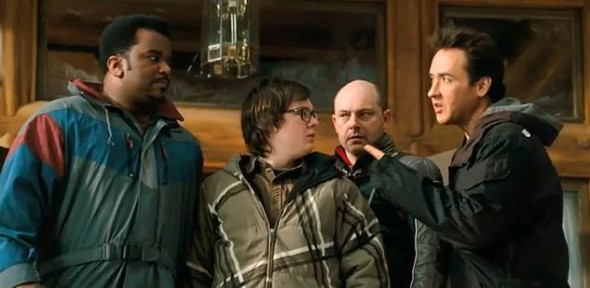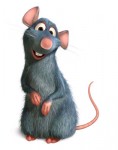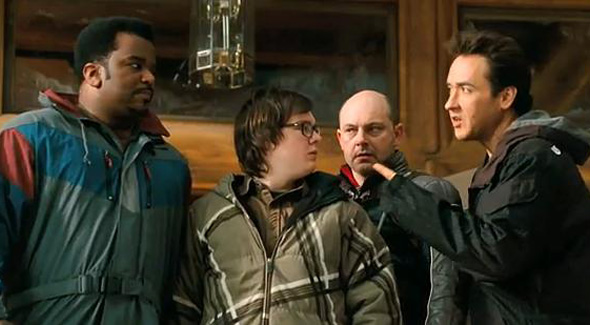
So unrealistic. No group of white dudes would actually have a black friend as cool as this guy.
[Warning: spoilers for Hot Tub Time Machine below]
I recently saw Hot Tub Time Machine, and it got me thinking about this idea of “wish-fulfillment” fantasies in movies. See, Hot Tub Time Machine is way more than the raunchy sex comedy its trailer would lead you to believe. It’s actually a surprisingly subtle and complicated deconstruction of the very idea of wish-fulfillment in movies. Heavy stuff, right? It’s a lot to Overthink; but first, let’s take a little refresher on the idea of wish-fulfillment in movies.

So unrealistic. There are no chicks this hot who live in Pittsburgh.
Most of the time, we pop culture snobs think that wish-fulfillment plots are a “bad thing” because in movies like She’s Out Of My League, they’re used as a writer’s lazy way of inserting himself into the movie as a nerdy guy who gets the impossibly perfect (and poorly developed) “Mary Sue” hot blonde character while discovering his unknown abilities.
Lame, right? We’ve seen it a million times, and although part of me likes to live vicariously through these male fantasies on the screen, part of me also feels pandered to and cheaply manipulated by these kinds of movies. It makes me upset that movie studios feel like they can easily take my money by churning out these improbable stories that prey on my feelings of inadequacy as a man.
Bad wish-fulfillment! Bad narrative structure! Bad, bad!

So unrealistic. Rats smart enough to cook can only be found in the NYC subways, not Paris.
Except, not all the time. Think about Ratatouille: it’s wish fulfillment through and through; it even shares a lot of the same plot elements of the slightly less critically acclaimed She’s Out Of My League. There’s the physically unattractive protagonist who’s wasting away at a low level job, the improbable plot devices that give him a big break (In case you forgot, the rat’s method of cooking involved pulling on a guy’s hair to control his limbs. Suspension of disbelief: consider it stretched.), and of course, the fulfillment of the highly improbable wish.
The difference between a She’s Out Of My League and a Ratatouille lies in the subtle implications of their respective acts of wish-fulfillment. When the schlumpy guy’s wish gets fulfilled in a lowbrow sex comedy, the audience gets the message that unrealistic male sexual fantasies and negative stereotypes in gender roles will win the day. When a lovable rat’s wish gets fulfilled in an uplifting Pixar movie, the audience gets the message that dedication to a dream and perseverance will win the day. The former is pandering; the latter is inspiring.
Now, back to the hot tub. Hot Tub Time Machine at first seems to be of the pandering type of wish-fulfillment movie. The protagonists are all men in their 40’s living unfulfilling lives. Through a series of improbable events, they returned to their youthful “glory days,” correct past mistakes, and remake their lives into sexier, wealthier, happier new versions.
This would be highly problematic if the movie were taking itself seriously, which, if you didn’t notice by the title, it definitely doesn’t do. Virtually every element of Hot Tub Time Machine toes the line between pandering wish-fulfillment movie and deconstruction of a pandering wish fulfillment movie. Let’s look at each of the main characters and their respective journeys towards wish-fulfillment:
- Craig Robinson as Nick Webber-Agnou: he was once an aspiring singer, but now he’s stuck in a humiliating pet massage job. We’ve seen the aspiring X stuck in Y job setup so many times before that we’re primed to believe pretty much anything, but then Robinson reaches into a dog’s butt and pulls out a car key. It’s mostly believable if you read this movie straight, but if you read it as a satire, it’s clear that this is meant to be an over-exaggeration of the “crappy job” setup.
- Rob Corddry as Lou, aka “The Violator”: he’s an outrageous party animal, the very embodiment of the id. At first, his wish-fulfillment exercise seems to be recapturing the partying excess of the 80’s, but at the end, it’s revealed that that excess had turned him suicidal. His wish-fulfillment turns out to be escaping suicide. It’s revealed in almost a passing manner towards the end, and it’s immediately followed by the “happy ending,” so there’s not a lot of time for the audience to meditate on it. But looking back, it’s pretty freaking dark and totally out of place in a typical wish-fulfillment fantasy. It’s as if the filmmakers are reminding us that in real life, suicidal people often don’t get the help that friends on a time travel trip provide. In real life, these people just wind up killing themselves. Yikes.
- John Cusack as Adam: take a look at John Cusack’s filmography if you need a reminder as to why he’s in this movie. The man who built his career on 80’s wish-fulfillment teen movies now finds himself in his 40s, alone, and unfulfilled. And what does he do, now that he’s got the chance to redeem himself in a wish-fulfillment scenario? He gets stoned and passes out on the ground, where the romantic interest just so happens to be passing by to take him on a final journey of discovery. It’s exactly the type of weak, happenstance-driven plot device that we’ve come to expect in these types of movies, and if this were any other movie, it’d be eye-roll inducing. But in this movie, with this actor, it’s a subtle but unmistakable dig at these types of happenstance-driven plot devices.
All of these individual character arcs lead up to the triumphant wish-fulfilling ending. Craig Robinson has his music career and his masculinity back, John Cusack is married to the mystery girl, and Lou hasn’t killed himself. The whole thing is clearly setup to be over-the-top and hammering home the idea that this movie is satirizing these kinds of happy endings, but there’s just enough saccharine sentimentality to lull the audience into a false sense of wish-fulfillment satisfaction. In particular, the soundtrack selection at the end fits perfectly with the movie’s “toeing the line” approach to wish-fulfillment. It’s “Once In A Lifetime” by The Talking Heads, which if you just listen to the lilting piano and the “Letting the days go by” refrain, seems like a nice, sweet way to end this movie.
But if you take a closer look at the lyrics of the song, you see that it fits surprisingly well with the movie’s dark undertones:
Same as it ever was, same as it ever was, same as it ever was, same as it ever was
Same as it ever was, same as it ever was, same as it ever was, same as it ever was
…
You may ask yourself, what is that beautiful house?
You may ask yourself, where does that highway lead to?
You may ask yourself, am I right, am I wrong?
You may say to yourself, my god, what have I done?
“My god, what have I done,” indeed. I think this applies to both the characters who, until their improbable time travel journey, have largely wasted their lives, as well as to the audience who keeps buying into silly and ultimately unproductive wish-fulfillment fantasies.
Man, that’s dark. I hate to end this on such a down note, so to pick things back up a bit, let me leave you with a bit of John Cusack wish-fulfillment fantasy:
http://www.youtube.com/watch?v=-j379JbL-xM

It makes me think how very few movies show Suicide from the guy who wants to die point of view in a serious way. Its usually for comedy.
But this also reminded me of the Back to the Future article. When they finally make it to the future and everything is changed slightly, the main characters really have no history there. Everyone they know would have had different experiences than them. Cusasck does not even know his dream’s girl favorite color or last name when he shows up. They all have 20 year gaps in their memories.
Harold, I think that’s one of the parts of time travel fantasies rarely covered by the script. In Back to the Future, for instance, more than Marty’s hand reappearing during the song, more than his family slowly spiriting into the picture, his entire mind would be reshaped by growing up in a more loving, more successful family environment. This, in turn, would warp the very same mind in the mall that hopped in the time machine to begin with– perhaps he would be studying instead of hanging out with Doc Brown and avoiding Libyans– and very possibly eliminate the same journey that caused him to reshape his mind. This loop can keep going, but it all hinges on speculation over whether or not the newly well-raised, well-adjusted Marty McFly would ever need/be able to travel back in time to help his parents connect in the past.
In Hot Tub Time Machine (spoiler alert: I haven’t seen it), the characters would NOT have gaps in their memory! They would have entirely new memories because their pasts would have been reshaped by the actions subsequent to entering the Hot Tub, cf. everything I said above.
Basically, unless time travel has a catch explained that you remain you because of a weird bubble (didn’t the Guy Pierce Time Machine do something like this?) or there’s a chronomancer or other type of wizard protecting your memory from being reshaped by whatever is changed in the past, changing any milestone events in your own human development is a recipe for disaster when it comes to narrative continuity.
I normally have high respect and regard for John Cusack, and between _2012_ and this, I was starting to wonder wtf is going on with him. But I haven’t seen the former yet, and if you say the latter is actually a deconstruction, especially with regards to his character in particular, I suppose my faith in the man is restored.
Since I haven’t seen the movie yet, I’d like to know where you think the youngest guy stands in terms of the narrative deconstruction of the genre, though. The previews show a younger guy that meets his mother when they go back in time. Is this encounter meant to remind us of how foolish it is to have unrealistic expectations, a sort of “be careful what you wish for” message?
@Gab
Re: the young kid and his function in the wish fulfillment deconstruction, you’re pretty much right on target (“be careful what you wish for”). But he’s also there to function as a voice of reason/reminder of real life’s harsh reality. While the rest of the guys are trying to live out their male fantasies and change their futures, he just wants to get home. He has no desire whatsoever to let loose or take any advantage of the situation. Also, if I recall the movie correctly, his life hasn’t changed much when he arrives in the new future. He still hates his parents, he doesn’t have a girlfriend, and he’s not more socially adjusted.
@Lee: So if he’s the voice of reason and still miserable, what’s that saying? Does his misery at the end get much recognition, or is it just in passing and easily missed?
OR- should I just see the movie? ;)